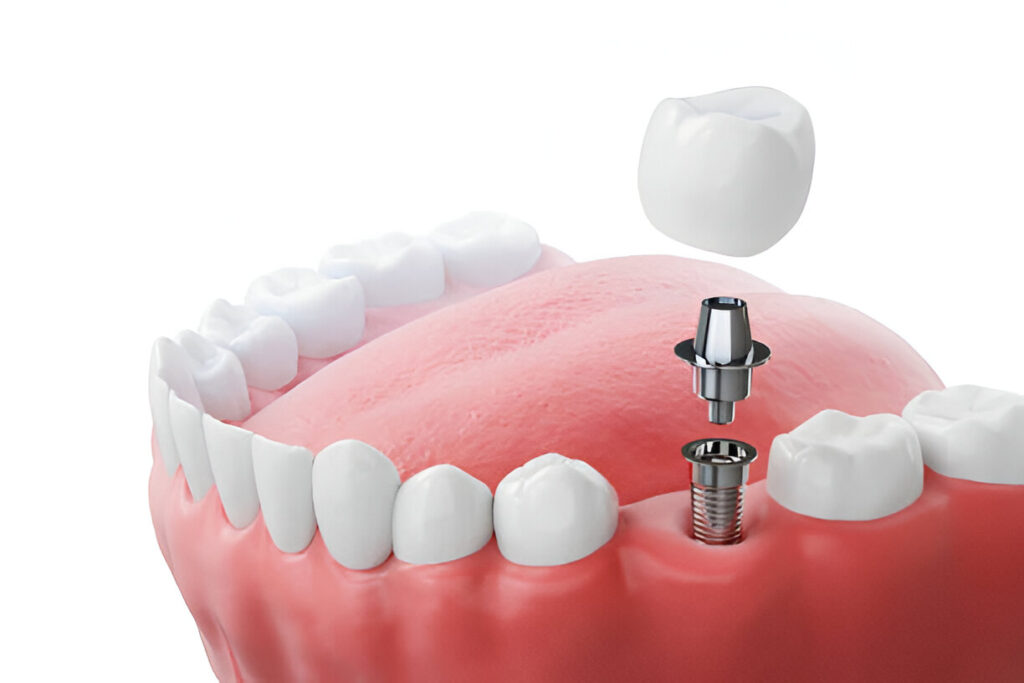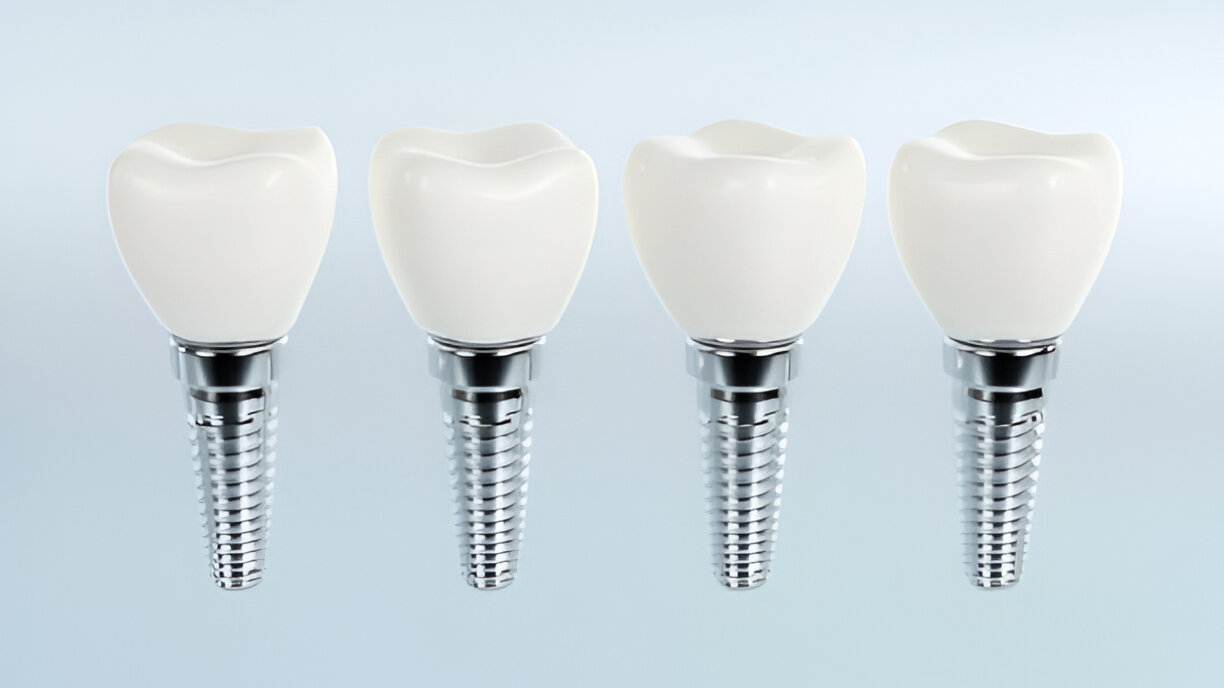Dental implants are a popular solution for replacing missing teeth. They offer both functionality and aesthetics, giving you back your smile and confidence. However, one common concern is whether the body can reject a dental implant. This article will explore the facts, discuss potential reasons for implant failure, and provide tips on how to prevent such issues.
What Are Dental Implants Made Of?
Dental implants are composed of three main parts:
- The Titanium Implant: This is the root of the replacement tooth. It is surgically placed into the jawbone to support the artificial tooth.
- The Abutment: This is a connector that attaches the implant to the replacement tooth or crown.
- The Crown: The visible part that looks and functions like a natural tooth.
Titanium is the most commonly used material for implants because it is biocompatible, meaning it is unlikely to cause allergic reactions or be rejected by the body. This material fuses with the bone in a process called osseointegration, which provides a stable foundation for the new tooth.
Can I Get Implants with Receding Gums?
Can Your Mouth Reject a Dental Implant?
Technically, your body doesn’t “reject” dental implants in the same way it might reject an organ transplant. This is because titanium, the material used in most implants, is not seen as foreign by the immune system. However, implants can fail, and this failure can feel like your mouth is rejecting the implant.
Common Reasons for Implant Failure
While dental implant rejection is rare, certain factors can lead to failure. These include:
1. Failed Osseointegration
Osseointegration is the process where the jawbone grows around the implant, securing it in place. If this process does not happen correctly, the implant can become loose or fall out. Some reasons for failed osseointegration include poor bone quality or underlying health conditions.
How Much Does a Single Dental Implant Cost in the UK?
2. Poor Oral Hygiene
Neglecting proper dental care after an implant can lead to infections. Infections in the gum tissue can cause bone loss around the implant, leading to instability and eventual failure.
3. Smoking
Smoking significantly increases the risk of implant failure. The chemicals in cigarettes reduce blood flow to the gums, slowing down healing and making it harder for the implant to integrate with the jawbone.
4. Gum Disease
Periodontal disease, or gum disease, can damage the bone and gum tissue that surround the implant. If left untreated, this can cause the implant to fail.
5. Teeth Grinding (Bruxism)
Grinding your teeth puts excessive pressure on the implant, which can weaken the bond between the implant and the bone. This constant stress can lead to failure over time.
What is the Best Age to Get a Tooth Implant?
6. Health Conditions
Certain health issues like uncontrolled diabetes or osteoporosis can slow down the healing process or weaken the jawbone, both of which can increase the risk of implant failure.
Symptoms of Implant Failure
Recognising the early signs of implant failure is crucial. If caught early, your dentist may be able to address the problem before it worsens. Some common symptoms of implant failure include:
- Implant Mobility: If your implant feels loose or moves, it may not have properly fused with the bone.
- Persistent Pain: While some discomfort is normal after surgery, ongoing pain could indicate a problem.
- Swelling or Redness: Inflammation around the implant area could signal an infection.
- Bone Loss: Gradual loss of bone around the implant site is a warning sign that the implant is failing.
Can Implant Failure Be Prevented?
While implant failure is rare, there are steps you can take to reduce the risks.
1. Maintain Good Oral Hygiene
Brushing and flossing regularly, along with using an alcohol-free antibacterial mouthwash, can help keep the implant area clean and free from infections. Good oral hygiene is key to long-term implant success.
Can You Lose Your Gums Around Dental Implants?
2. Quit Smoking
If you smoke, it’s recommended to quit, especially before and after the implant procedure. Smoking greatly increases the chances of implant failure and slows the healing process.
3. Treat Health Conditions
If you have conditions like diabetes or osteoporosis, work with your healthcare provider to keep these conditions under control. This will improve your body’s ability to heal and reduce the risk of implant failure.
4. Follow Post-Surgery Instructions
Your dentist will give you specific guidelines to follow after surgery. This may include avoiding certain foods, managing pain, and attending follow-up appointments. Adhering to these instructions is vital for implant success.
Can NHS Pay for My Dental Implants?
5. Address Teeth Grinding
If you grind your teeth, speak to your dentist about getting a mouthguard. This can help protect the implant from excessive pressure and improve its longevity.
What Is the Success Rate of Dental Implants?
Dental implants are highly successful for most patients. The success rate is typically around 95% when proper care is taken. The few cases of implant failure are often due to factors that can be controlled, such as smoking or poor oral hygiene.
Conclusion
While it is uncommon for your body to reject a dental implant, various factors can lead to implant failure. Maintaining good oral hygiene, addressing health issues, and following your dentist’s post-surgery instructions are all important steps to ensure the success of your dental implant. By taking care of your oral health, you can enjoy the long-term benefits of dental implants.
If you’re considering dental implants, it’s always a good idea to discuss any concerns or health conditions with your dentist. They will help guide you through the process and make sure you are a suitable candidate for the procedure.
How Many Teeth Can One Implant Replace?
Take the Next Step with Holburn Dental and Implant Centre
If you’re considering dental implants and want expert guidance, Holburn Dental and Implant Centre is here to help. Our experienced team provides personalised care to ensure your dental implant procedure is successful and comfortable. We use the latest technology to give you the best results, and we’re committed to making sure you understand every step of the process. Schedule your consultation today and take the first step towards a confident, healthy smile with Holburn Dental and Implant Centre.
Schedule Your Consultation Today!


